1.

My grandmother Mary died last November at ninety-three, after six months of at-home hospice. It was on a Tuesday. By Thursday, my mother and I were in Philadelphia getting out the vote for Hillary Clinton. Mom was exhausted after a year of caring for her mother, and I was crying relentlessly—but still, we went, compelled to do something tangible with our grief.
Is the daughter’s work to fulfill the unrealized dreams of her mother, as the Shonda Rhimes film about Hillary at the Democratic Convention suggested? Maybe. So we campaigned hard, my mother and I. We both wanted to make sure Hillary won. Getting her elected was about many things, among them the longings of great-grandmothers, grandmothers, mothers, and daughters. Generations of women. My grandmother was born three years after white women won suffrage and died just days after casting her absentee ballot for Hillary. My mother was the first-born of six children, the first pregnancy of eight. My mother had me in 1968 because she was unable to obtain an abortion—illegal in the days before Roe v. Wade. A pilgrimage to rally behind this woman we so badly wanted elected was the only thing to do in those vivid, blurry days after Mary died. We’d lost Mary, but we could win for women. We could, my mother and I, try to make this happen together. I don’t have children, there’s no one after me to realize my mother’s dreams; it feels important what I do for women in this life.
As we rolled into Philly, we stopped in to see my great-aunt, Marie, ninety-four. My grandfather’s sister. The last tether in this family to that generation, that era. She was thrilled that “we’re finally going to get a woman in there!” Generations of women. The dreams of the mother. Full circle.
2.

Originally my mother and I had planned to go to Ohio to campaign for Hillary. But after Gran died, we switched to Philadelphia, to be closer to my mother’s home in DC. The wake and funeral were held the day before the election.
In Philly we went to Stevie Wonder’s concert for Hillary, walked out of our hotel into a swarm of people heading the couple of blocks to the venue, cops with the streets closed, Hillary supporters everywhere. i’m with her T-shirts. Everyone smiling, the opposite of a funeral, drunk with hope and belief. “Are all these people going to see Stevie?” my mother asked. They weren’t, it was a small venue. “I think they just want to be out here,” I told her. “I think they just want to be part of this.” In the concert hall I noticed a wall of clinton/kaine and love trumps hate signs. A Hillary staffer on stage roused the crowd, imploring people to get out the vote. “No one is too good to knock on doors and make phone calls.” The crowd chanted. Someone shouted, “Are we taking Pennsylvania for Hillary or what!” Then Stevie came on. “We’re going to make a difference,” he said. “I’m ready to celebrate.”
After the show, Mom and I held hands walking back, singing along with the others in the street. Later, drifting off to sleep in our respective beds, for the first time in thirty-five years she whispered to me, her long-avowed atheist daughter: “Say your prayers.”
3.

My mom and I spent all day Saturday in south Philadelphia, at the Clinton campaign office and in the surrounding streets. Mom spent all day calling voters, sent me out for donuts, and shook her head at me for spending too much time interviewing people and not enough time on the phones. My grandfather Gus and Aunt Marie also grew up in South Philly, on Emily Street. I thought of my grandmother telling the story of traveling with Gus from DC to the house here in South Philly—back in 1946, when their relationship got serious—to meet his mother. I thought of my mother coming here to her grandmother’s on weekends during her childhood and adolescence, plotting a way to sneak out for American Bandstand. Heading out to knock on doors with volunteers, a group of gay male students from Temple University, I thought of all the ways the world had changed in the seventy years since my grandparents had met. It occurred to me that my family’s American roots were—and still are—in Philadelphia and DC, twin cities bound in mutual purposes of independence and democracy. I was proud of my family in that moment—proud of mother hunkered down at the desk, calling; proud to be on the streets for Hillary. Proud to be an American patriot.
Later in the evening, as we were checking out of our hotel, I saw Ben Franklin’s image. Nearly two and a half centuries of men at the helm, all white except one. I turned to my mom, pointed to Ben, “I think his head might blow up if he were here.” That’s what we were doing, laying dynamite on centuries of white patriarchy. I realized that in seventy-two hours, once Hillary had won, we would have exploded the catalogue of myths that come with legacy.
4.

We’d buried my grandmother in the morning, but by Monday night, the night before the election, I was back in Philadelphia for Hillary’s election-eve rally. “The Night Before” theme the campaign had named the rally hung in the air, was in the songs and speeches. Tomorrow the world would change. Jon Bon Jovi sang. Bruce Springsteen sang. “Thunder Road!” (“I’m pulling out of here to win.”) President Obama spoke about legacy, continuing the fight, leaning forward. How far we’d come since 2008. Members of the press I hadn’t seen since Iowa were hugging me. “She did it! Congratulations!” It was a done deal. Everyone in the press scrum—many of whom had been hard on Secretary Clinton and not nearly hard enough on Donald Trump (he was entertainment, after all, not a viable threat)—was smiling, snapping pictures on their phones to record the moment. The air was chilly, and the media tent offered hot chocolate in Styrofoam cups. Reporters were toasting one another, ostensibly that the campaign was over, a campaign some of them had been covering for eighteen months, for tens of thousands of miles. But they were also toasting the fact that Trump would not be president. We all talked about the victory party scheduled for the following night in New York, anticipating it like a prom. The press gaggle can have a certain detached air to it. People are tired, they are cranky, and in some cases they’ve been away from home for a long time. It’s a hard beat, more slog than glamour. But on this fall night it seemed like we were all—the cheering crowds, the celebrities, the Obamas, the Clintons, the press—in it together, this thing called the future of the country. This was the night before we were changing history, electing a woman, and for those not as passionate about that marker, we were at least protecting the nation from making an epic and historic error.
5.

The Famous Fourth Street Delicatessen is where politicos gather in Philadelphia, especially on Election Day. They appear in their suits and finery after voting and glad hand and hug and eat enormous meals. It’s festive and resplendent. I spent the night in Philadelphia after the rally, too exhausted after a day of funerals and history to drive home. I was with a friend having a fast nosh at the deli, taking in the circus, before heading south two and a half hours to vote at the firehouse, a block from my house, in my tiny Delaware town. (I voted wearing my THIS PUSSY GRABS BACK T-shirt). After I voted I was going to shower and change and drive north to New York, to the Clinton victory party. My piece on Hillary’s election and this final week was due to my editor at 6 a.m. Wednesday morning, so an all-nighter was ahead. But I was excited about her imminent election, and I knew adrenaline would get me through the next day or two—so why worry about sleep? Why miss history? A great day and night was ahead. A great future awaited.
They weren’t there when we got to the deli, but when we left, a bunch of union guys from the building-trades union were outside with a giant cutout figure of Hillary, lifting it up and down, encouraging drivers to honk their support. Later we’d learn how white men failed Hillary Clinton, failed the country—it was white men who gave Donald Trump his victory, with the largest recorded gender gap in history—but on election morning in South Philadelphia, everyone—including working-class white men, proudly displaying their union garb—were out for Hillary in droves. The scene was carnival, joy, elation. Strangers hugged one another on the street. “It’s a great day,” we said. And for a while I looked at those men—cheering for Hillary, holding her aloft.
These dispatches are from #VQRTrueStory, our social-media experiment in nonfiction, which you can follow by visiting us on Instagram: @vqreview.








